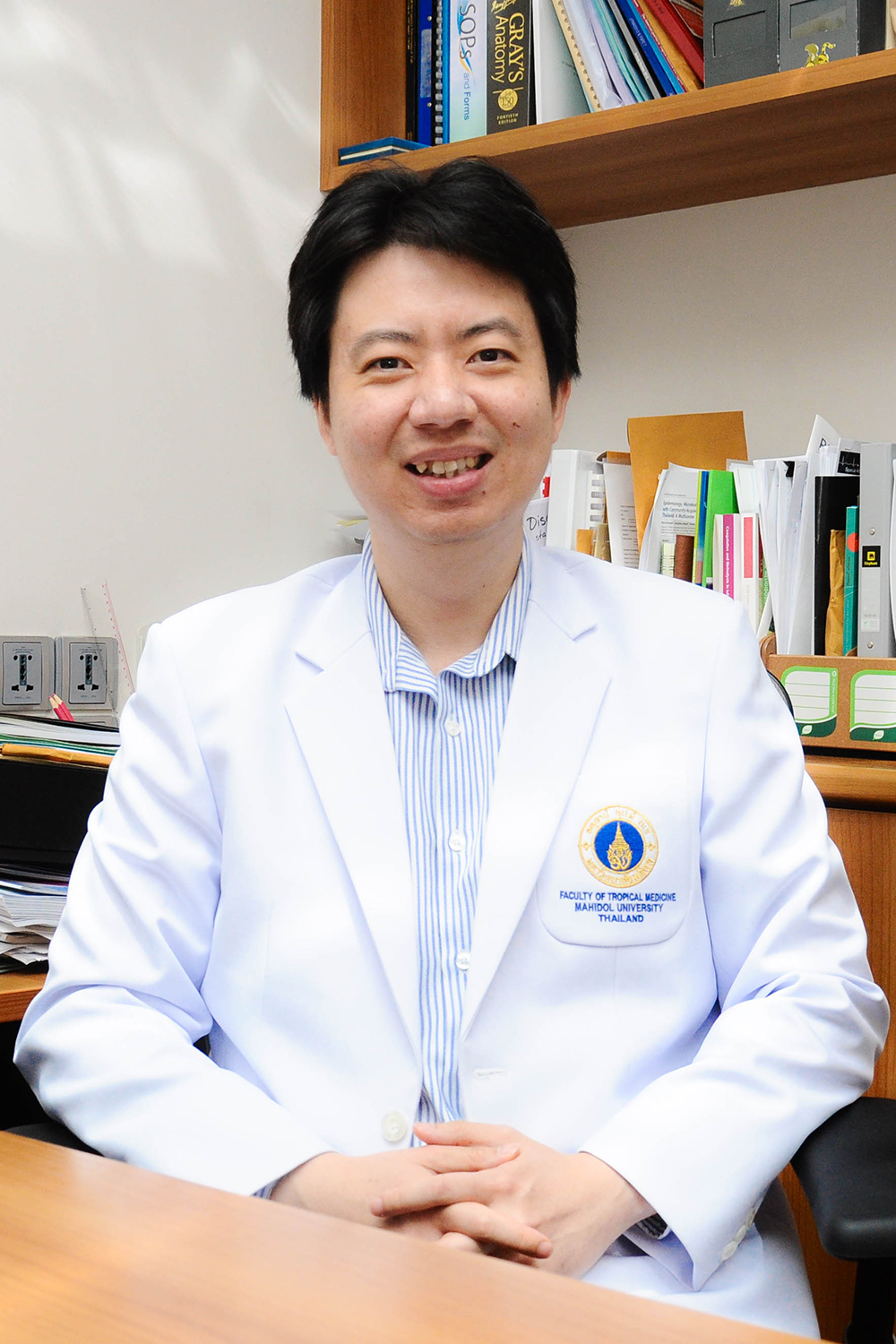
Background
Dr. Direk Limmathurotsakul is Associate Professor in the Department of Tropical Hygiene. He holds a Doctor of Medicine degree from Chulalongkorn University, Thailand, an M.Sc. in Medical Statistics from London School of Hygiene and Tropical Medicine, and a Ph.D. in Life and Biomolecular Sciences from Open University, United Kingdom. Dr. Direk is an international authority on melioidosis, an often-fatal infectious disease caused by bacteria Burkholderia pseudomallei.Departments/Centers
Research
Melioidosis, an often-fatal infectious disease caused by Gram-negative bacteria Burkholderia pseudomallei, is one of Direk’s main research areas. He demonstrated for the first time that ingestion and inhalation are important infection routes for melioidosis in northeast Thailand, and developed the first evidence-based guidelines for the prevention of melioidosis for people living in endemic areas. He is also a chair of International Melioidosis Society [IMS] (http://www.melioidosis.info). Direk recently estimated there to be 165,000 human melioidosis cases per year worldwide, of which 89,000 (57%) die (Nature Microbiology 2016). Using this work, Direk has convened and contributed to a number of meetings between researchers and policy makers in multiple countries, including Thailand, Vietnam, Malaysia, Cambodia, Indonesia, India, Sri Lanka, Bangladesh and Brazil. Supported by an attention of public health officials and policy makers, actions are being taken to improve diagnosis, treatment and prevention of melioidosis in many tropical countries.
Antimicrobial resistance is also one of Direk’s main research areas. By integrating routinely collected data from a range of databases, he estimated that around 19,000 excess deaths are caused by multi-drug resistant bacteria in Thailand each year (eLife 2016). He also shows that under-use of bacterial cultures is a critical issue in low and middle-income countries, and that may lead to an underestimate and underreporting of the incidence of antimicrobial-resistant infections (AJTMH 2017). These findings suggest that more studies with a systematic approach and appropriate statistical modeling are need to be done in other low- and middle-income countries (LMICs), especially in countries where microbiological laboratories are readily available and routinely used. Further work is also needed to identify where resources and attentions are most needed to effectively fight against antimicrobial resistance in LMICs.
Direk advocates the concept of ‘antibiotic footprint’ as a tool to communicate to the public the magnitude of antibiotic use in humans, animals and industry. Antibiotic footprint could be estimated by combining the total amount of antibiotics consumed by humans and animals in the country (www.antibioticfootprine.net). His team also developed an offline, open-access and easy-to-use application that allows a hospital to perform data analysis on AMR independently (http://mice.tropmedres.ac/amass.aspx). To support communication with lay people and solve a problem of jargon surrounding AMR in local languages, Direk also initiated the AMR Dictionary (www.amrdictionary.net).
Direk is also an expert in Bayesian statistics and statistics for evaluating diagnostic tests. He developed a user-friendly open-access web-based application, http://mice.tropmedres.ac, that allows general researchers to apply imperfect gold standard Bayesian latent class models to their own data sets.
Ongoing Research Project(s)
-Educations
| 2000 | M.D. | Chulalongkorn University, Thailand |
| 2008 | Ph.D. (Life and Biomolecular sciences) | Open University, UK |
| 2009 | M.Sc. (Medical Statistics) | LSHTM, UK |
Research of Expertise
- Medical statistics
- Antimicrobial Resistance (AMR)
- Melioidosis
Diseases Covered/Research Area
- Melioidosis
- Antimicrobial resistance (AMR)